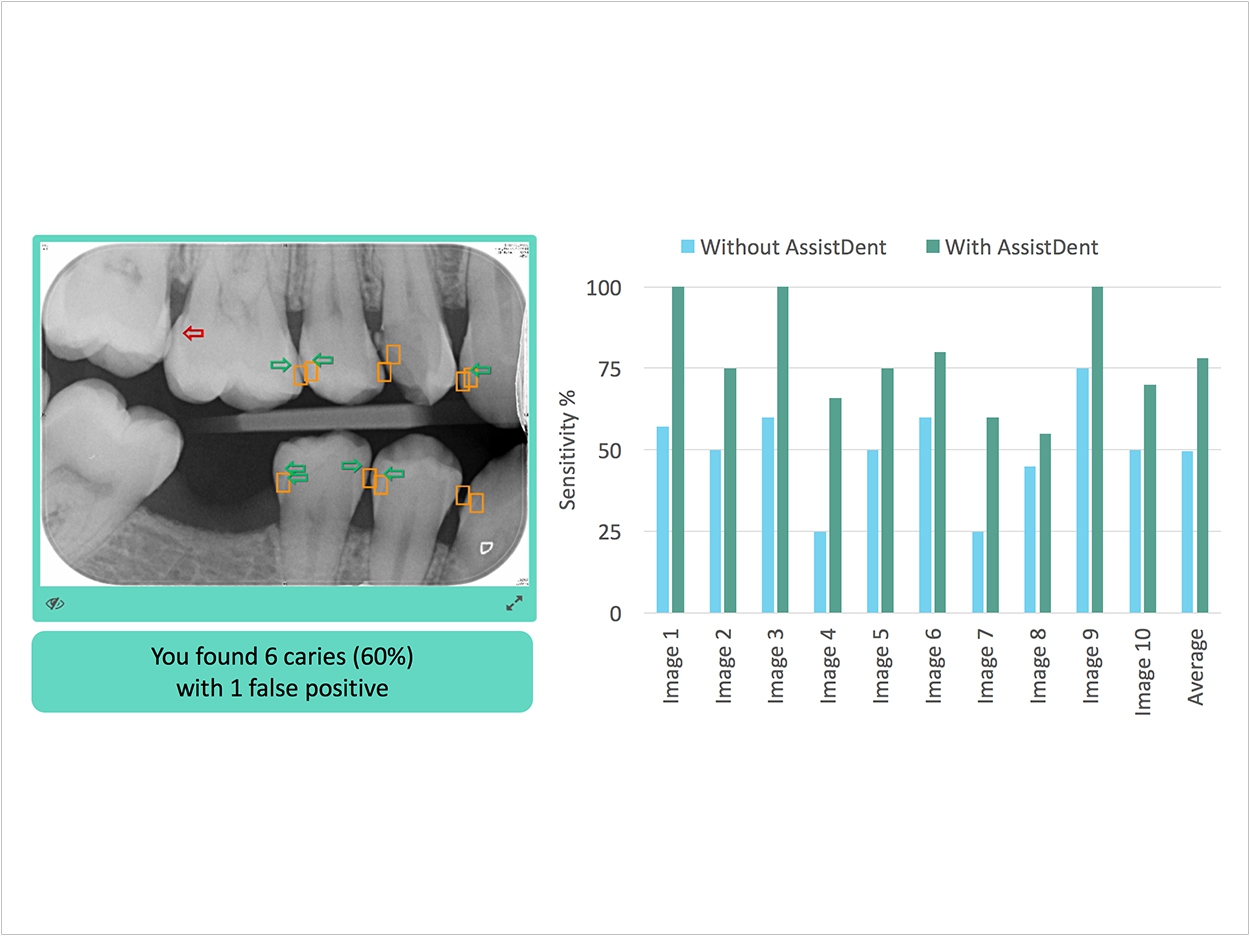
As the constraints of COVID-19 have limited dental schools’ ability to train their students in practical, hands-on care, Innovate UK has awarded funding to Manchester Imaging to adapt and repurpose its AssistDent machine learning algorithms so dental students can improve their dental radiography analysis abilities remotely.
AssistDent helps clinicians diagnose early dental disease. Dentists and dental schools across the United Kingdom and Europe use it as a prompting system when they are analyzing bitewing radiographs, looking for early signs of enamel proximal caries.
The funding from Innovate UK, which is the United Kingdom’s governmental innovation agency, enabled Manchester Imaging to adapt and repurpose its technology to analyze dental radiographs and deliver a remotely accessible intelligent learning platform for dental students that can record their clinical assessment of a radiograph, automatically interpreting and evaluating it against a gold standard assessment.
At an early phase of the research process and to evaluate a novel application of computer-aided diagnosis based on artificial intelligence (AI) in dentistry training, the company launched a study with 24 third-year dental student volunteers randomly divided into control and experimental arms. Both groups examined the same images using the same graphical user interface, with the AssistDent caries detection function disabled for the control arm.
The study showed an increased ability in the detection of enamel-only proximal caries by the students using AssistDent, showing a mean sensitivity level of 0.80, increased from 0.50 shown by students not using AssistDent. This improvement was achieved without an increase in false positives. Mean false positives per bitewing radiograph recorded by students when using AssistDent was 2.64, compared to 2.46 by students who didn’t use AssistDent.
A set of example radiographs with expert annotations is available through the platform as a gold standard for student use. Or, tutors can provide their own images and annotations.
Within the study, gold standard annotation of caries was obtained from a panel of five dentomaxillofacial radiologists and one professor of restorative dentistry, each of whom performed a clinical evaluation on a set of images and provided annotation on the location and grade of caries, resulting in a gold standard set of 1,972 examples of enamel-only proximal caries for algorithm training and evaluation.
The graphical user interface enables students to add their clinical assessment, marking up identified pathologies. A machine learning algorithm automatically analyses the image and intelligently compares the tutor’s gold standard analysis with that of the student, accounting for the underlying mouth anatomy and giving a detailed breakdown of all the pathology identified (true positives) as well as missed (false negatives) and incorrectly classified (false positives), providing the tutor with a score for each image.
Students now can get a detailed breakdown of their performance and learning process, Manchester Imaging said, in conjunction with their tutors without needing to physically attend the dental school.
The project to adapt Manchester Imaging’s existing technology was funded through Innovate UK’s Business-Led Innovation in Response to Global Disruption competition, a rapid response funding program that received more applications than all of its competitions for the previous year combined.
“The COVID-19 situation is not just a health emergency, but also one that affects the economy and society,” said Neil Morgan, head of Fast Start at Innovate UK. “With that in mind, Innovate UK launched this Fast Start funding, seeking smart ideas from UK innovators. Like other primary care providers, the dental sector has been particularly impacted, so AssistDent’s technology is particularly timely and useful as we seek to get through and recover from the pandemic.”
The award for AssistDent is clear evidence of governmental recognition of the need to financially support the development of new technologies across the dental profession and to help companies innovate for public health, Manchester Imaging said.
“We are delighted to have received this support from Innovate UK, which has helped facilitate the early and rapid adaptation of our technology to help address current pressing dental educational needs during this pandemic,” said Tony Travers, CEO of Manchester Imaging.
“The sector has been particularly hard hit by COVID-19, both functionally and economically, and we hope the technology now available will continue to assist both institutions and students, harnessing intelligent automation and increasing opportunities for online, remote clinical learning,” Travers said.
Related Articles
Dentistry Shakes Hands With Artificial Intelligence
Partnership to Develop AI-Assisted Dental Image Analysis Tools
To Maximize AI’s Benefits, Dentistry Needs a More Collectivist Mindset


